Millions of Nicaraguans will spend Christmas under the growing repression of communist dictator Daniel Ortega, who has arrested and banished members of the Catholic Church, prohibited Catholic festivities, and intimidated Christians into silence.
Nicaraguans are a majority Catholic people. Out of the country’s roughly 6.35 million citizens, 50 percent identify as Roman Catholic and 33.2 percent identify as Evangelical Christian. Another 2.9 percent identify as practitioners of other religions.
Ortega, who himself claims to be Catholic, has maintained a fierce animosity against the Catholic Church throughout the four decades of Sandinista rule in Nicaragua, declaring a “war” against the Vatican in 2022 and openly stating that he has never held any respect for the Church’s bishops.
Ortega and his wife, Vice President Rosario Murillo, have used the full might of the Sandinista regime they rule to punish the Nicaraguan Catholic Church for its support of pro-democracy dissidents during 2018’s wave of peaceful protests, when thousands of Nicaraguans flocked to the streets calling for the end of four decades of communist rule.
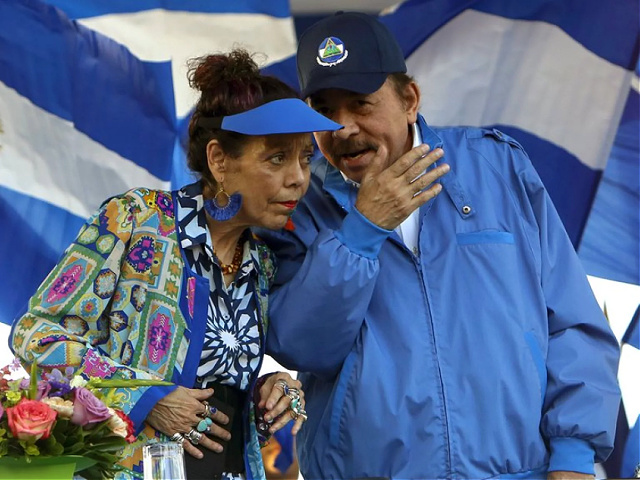
Nicaragua’s President Daniel Ortega and his wife, Vice President Rosario Murillo, lead a rally in Managua, Nicaragua. Nicaragua’s government on August 23, 2023, declared the Jesuit religious order illegal and ordered the confiscation of all its property. (AP Photo/Alfredo Zuniga, File)
The Church’s support of the pro-democracy dissidents led to Ortega branding Catholic bishops “terrorists,” accusing them of conspiring to stage a coup. Ortega also claims that the Church was “covering up [for] a gang of assassins” that, according to him, tried to assassinate him in 2018.
The Ortega regime’s “punishment” of the Catholic Church started as violent assaults against Catholic churches in Nicaragua carried out by Sandinistas on behalf of the ruling regime. It has now morphed into full-blown regime persecution of the Nicaraguan Catholic Church, dramatically escalating in 2022 and 2023.
The Ortega regime has banned the Nicaraguan Catholic Church from celebrating its traditional festivities and processions. Public celebrations of the feast day of Our Lady of Guadalupe and the feast of the Immaculate Conception became the latest additions to a growing list of banned celebrations ahead of this year’s Christmas season.
Nicaraguan authorities repeatedly claim that the prohibitions are necessary for “public security” reasons, providing no evidence for how these peaceful religious activities allegedly pose a threat. Such warnings prevent the faithful from freely exercising their religious freedom.
During Lent in 2023, the Ortega regime banned all Holy Week processions nationwide, including the Via Crucis (Stations of the Cross) processions that commemorate Jesus Christ’s last day on Earth prior to resurrection.
In 2022, Catholic processions for Saints Michael and Jerome and La Purisima and La Griteria, unique Nicaraguan celebrations that honor the Blessed Mother Mary, were also banned.
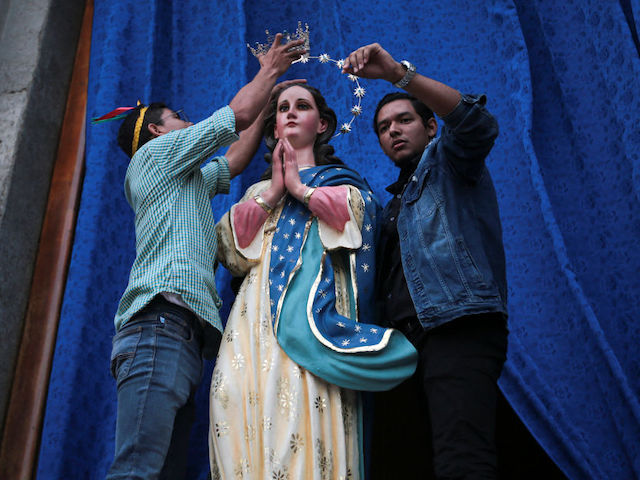
People decorate a sculpture of the Virgin Maria de la Concepcion during celebrations marking “La Griteria” at the Metropolitan Cathedral in Managua, on December 7, 2023. (Photo by AFP)
Journalists who “dare” to cover their local Catholic festivities are subject to the Sandinista regime’s retaliation. Such is the case of Nicaraguan reporter Victor Ticay, who police arrested in his hometown of Nandaime for the “crime” of covering La Reseña, a centuries-old local Catholic procession celebrated in Nandaime during Holy Week, and publishing footage of the event on social media.
Ticay was sentenced in August to eight years in prison on “spreading fake news,” “conspiracy to undermine national integrity,” and “treason” charges.
When it comes to repression against members of the Nicaraguan Church, the most significant case is the arrest and sentencing of of the Bishop of Matagalpa, Monsignor Rolando Álvarez, an outspoken critic of Ortega who has been held asa political prisoner since August 2022.
Álvarez was arrested in August 2022 alongside seven other members of the Catholic Church at the end of a two-week long police raid on the priest’s house. Days before his arrest, Murillo accused Álvarez of having committed “sins against spirituality.”
Álvarez was sentenced to 26 years in prison for “treason” in February and was stripped of his Nicaraguan citizenship, rendering him a stateless person — an act that is in clear violation of international law. Álvarez’s lawyer, Yonarqui de los Ángeles Martínez García, was permanently barred from practicing law in May.
As of December 17, Álvarez has spent over 500 days in prison.
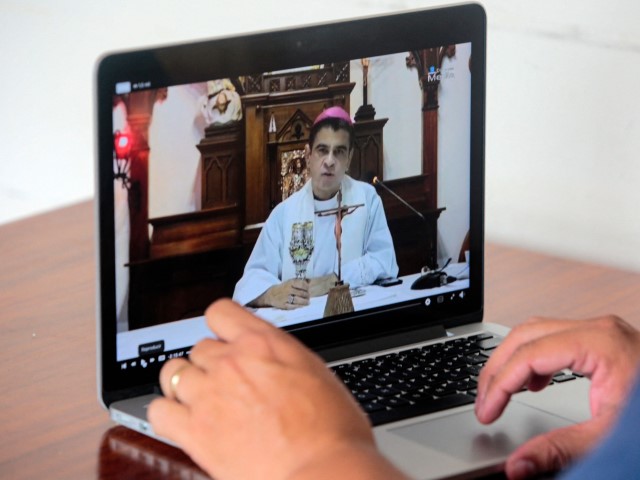
A man watches the mass of Monsignor Rolando Alvarez via Facebook in Managua, on August 11, 2022. (OSWALDO RIVAS/AFP via Getty Images)
Last week, 63-year-old Bishop Isidoro del Carmen Mora Ortega (no relation to the dictator) was arrested, becoming the second bishop behind bars in the country.
Bishop Mora’s “crime” was that he had offered prayers for Álvarez alongside members of the Nicaraguan Episcopal Conference. The Bishop was reportedly intercepted by the Nicaraguan Police when he was on his way to the Santa Cruz parish, where he planned to preside over the Confirmation of 230 parishioners, according to local sources.
In November, several members of the Nicaraguan Catholic Church who have been persecuted recounted their harrowing experiences to Congress. The witnesses detailed how they were arrested, interrogated, and brutalized by the communist regime, which accused them of being part of an “organized crime” syndicate simply for being Catholic.
“We were accused of being members of an organized crime gang and that the leaders were the bishops, and above all they said Rolando [Álvarez]. I was accused of undermining the dignity of the state and of Nicaragua, of spreading false news,” one of the witnesses said.
Álvarez is the first Catholic priest to be arrested following Ortega’s return to power in 2007. Since his arrest and sentence, the priest has only been shown in pictures and footage released by the Ortega regime that show Álvarez looking visibly thin. Álvarez remains imprisoned in La Modelo, located in the outskirts of the nation’s capital, Managua. La Modelo is infamously known for the torture and beating of prisoners that occurs on a daily basis.
The seven men arrested in the raid on Álvarez’s home — four priests, two seminarians, and a layman — were sentenced to ten years in prison in February on “treason” and “fake news” charges.
In October, Catholic priests Julio Ricardo Norori and Iván Centeno were kidnapped by Nicaraguan police forces dressed in civilian clothing while they were in their respective churches.
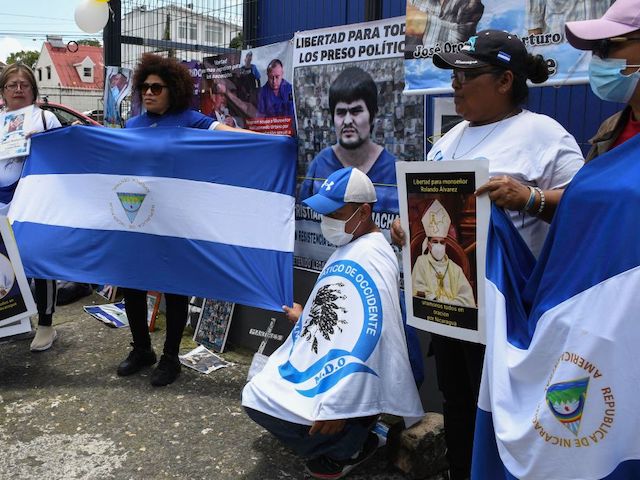
Nicaraguan citizens hold a demonstration in front of the Nicaraguan Embassy in Costa Rica to protest against the Nicaraguan government and the detention of Nicaraguan bishop and regime critic Rolando Alvarez, in San Jose, on August 19, 2022. (OSCAR NAVARRETE/AFP via Getty Images)
Other members of the Catholic Church were banished instead of arrested in 2022, including the papal nuncio, Archbishop Waldemar Stanislaw Sommertag, and 18 nuns from the Missionaries of Charity congregation. Monsignor Silvio Báez fled Nicaragua in 2019 at the request of Pope Francis after several threats made to Báez’s security.
In 2022, the Ortega regime began to forcefully shut down Catholic television and radio stations. As of November 2023, at least 15 Catholic media outlets have been closed down along the dozens of dissident media outlets shutdown or seized by the communist Ortega regime.
The regime froze the Nicaraguan Catholic Church’s bank assets and seized or shut down Catholic-led universities throughout the country. The Jesuit order-run Central American University (UCA) of Managua was completely seized by the regime in August. The John Paul II University and the Autonomous Christian University of Nicaragua (UCAN) were shut down by the regime in March.
Much like the socialist Maduro regime in Venezuela, the Ortega regime persecution includes not just silencing real Catholic voices, but hijacking the faith in the service of socialism.
Ortega and his wife Murillo, after banning the festivities of the Feast of Our Lady of Guadalupe, celebrated their own socialist version of the festivity last week, in which Murillo accused the Catholic Church and dissidents of her husband’s communist regime as spreading “terrorist hate.”
Christian K. Caruzo is a Venezuelan writer and documents life under socialism. You can follow him on Twitter here.
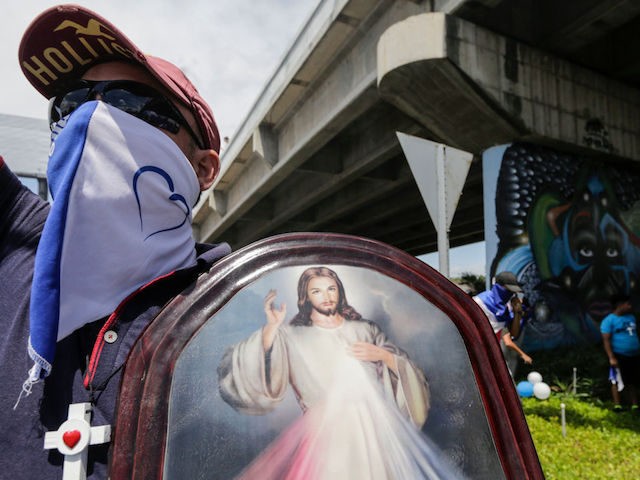
COMMENTS
Please let us know if you're having issues with commenting.